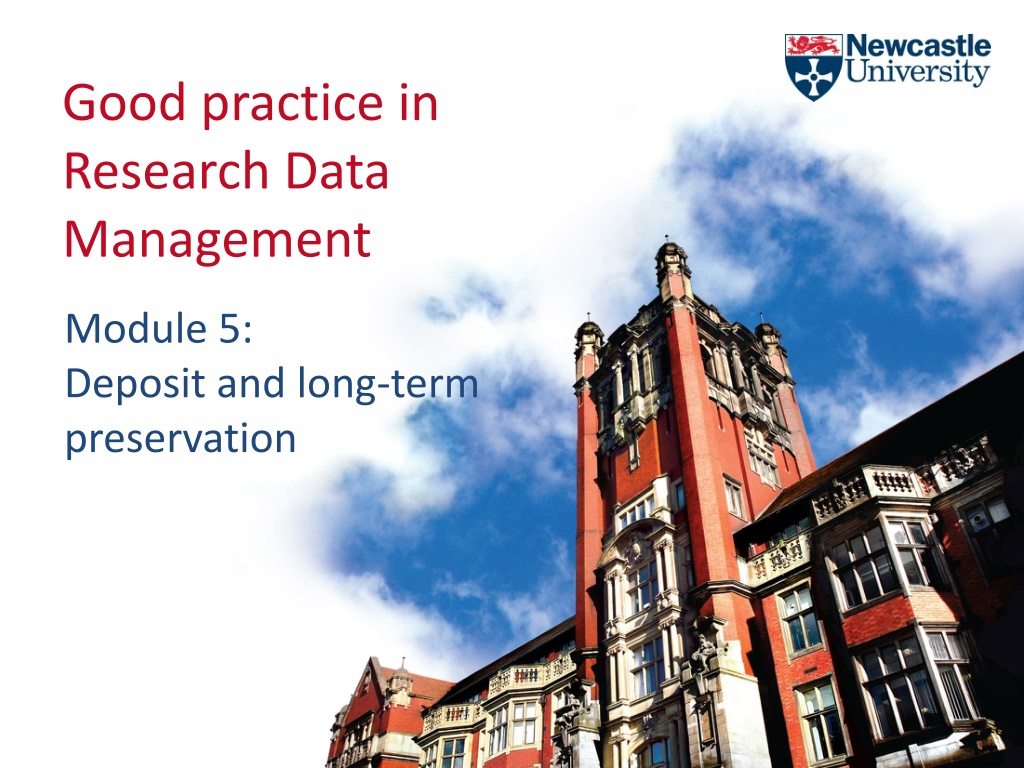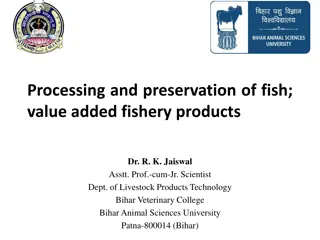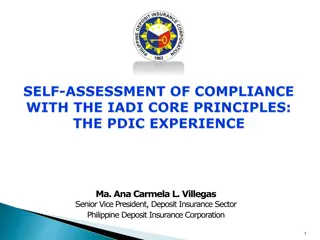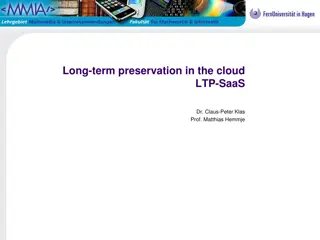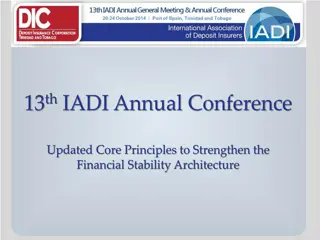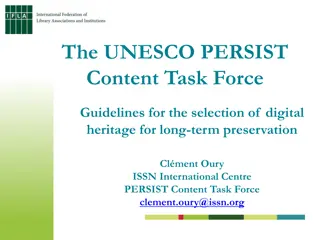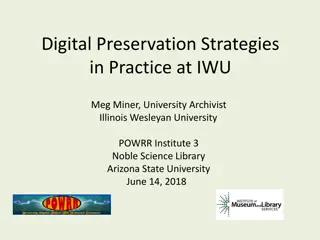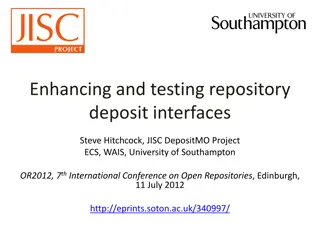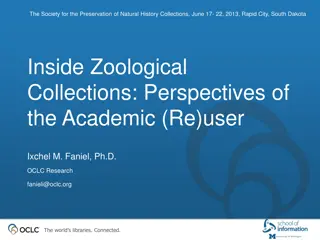Best Practices for Research Data Management: Deposit and Long-Term Preservation
Explore essential topics in long-term data management, including considerations for data centers and repositories, metadata usage, and digital curation. Understand the distinctions between digital archiving, preservation, and curation, along with key questions regarding data deposits and embargoes. Learn the importance of long-term preservation for enhanced impact, citations, and collaboration opportunities. Discover various data centers and repositories for depositing data, including funder-mandated options and subject-specific repositories.
Download Presentation

Please find below an Image/Link to download the presentation.
The content on the website is provided AS IS for your information and personal use only. It may not be sold, licensed, or shared on other websites without obtaining consent from the author. Download presentation by click this link. If you encounter any issues during the download, it is possible that the publisher has removed the file from their server.
E N D
Presentation Transcript
Good practice in Research Data Management Module 5: Deposit and long-term preservation
Topics Considering the long-term Data Centres and repositories Metadata and the Newcastle University Research Data Catalogue
Distinctions and definitions Digital archiving Concerned with backup and maintenance Digital preservation Concerned with maintaining access Digital curation Concerned with the holistic range of processes applied to data over its lifecycle
What is digital curation? Digital curation, broadly interpreted, is about maintaining and adding value to a trusted body of digital information for current and future use. (DCC)
Key questions Where will you deposit your data for the long- term? Will you embargo the use of your data? Why? How long for?
Why is long-term preservation important? Access, use and re-use for you and for others More impact More citations More opportunities for collaboration
Where do I deposit my data? Funder mandated data centre or repository Subject repository National data centre
Example funder mandated data centres / repositories A few of many UK Data Service - Economic and Social Data http://www.ukdataservice.ac.uk/ NERC data centres (x7) http://www.nerc.ac.uk/research/sites/data/ European Nucleotide Archive (European Bioinformatics Institute) http://www.ebi.ac.uk/ena/ MRC Research Data Gateway https://www.datagateway.mrc.ac.uk/ UK Data Archive for the social sciences http://data-archive.ac.uk/ More information http://research.ncl.ac.uk/rdm/policyandgovernance/nationaldatacentres/
Benefits of depositing data in a data centre or repository Increased efficiently - save time and money All the data in one place = larger datasets for analysis Reduced risk of duplication of effort Data centre protocols help ensure that data is produced in a format that is valuable to researchers
Example subject repositories Can be open, or funder mandated Archaeology Data Service MIMAS Data DRYAD DataCite Re3data Chemical Database Service
METADATA AND THE NEWCASTLE UNIVERSITY RESEARCH DATA CATALOGUE
What is metadata? It's "data about data"! Explains the origin, purpose, time reference, geographic location, creator, access conditions and terms of use of a data collection Metadata are typically used: for resource discovery, providing searchable information that helps users to easily find existing data as a bibliographic record for citation
Working with metadata When depositing in an archive or with a data centre A metadata template, structured to international standards or schemes, normally provided Metadata powers resource discovery Via meaningful dataset titles, descriptions, keywords and other information
Example funder stipulation: EPSRC Principle 6 Sufficient metadata should be recorded and made openly available to enable other researchers to understand the potential for further research and re-use of the data. Published results should always include information on how to access the supporting data. http://www.epsrc.ac.uk/about/standards/researchdata/Pages/principles.aspx
Activity reused under cc-by-sa license form RDM Rose, Jisc project 2012- 13, University of Sheffield ACTIVITY: HOW MUCH METADATA IS "SUFFICIENT METADATA"?
Metadata scenario The University of Poppleton holds a dataset with meteorological observations, taken at the university s weather station. In particular, it contains a set of precipitation measurements since the foundation of the university. A climatologist, Jenny Fairweather, is interested in this dataset for her research into climate change. She is looking for trends in the weather. A meteorologist, Wilson Rainbird, who works for the UK Met Office wants to use these data for the purposes of weather prediction. He is mainly interested in combining these precipitation measurements with other similar datasets. A researcher, Alice Snowe, from another university s Accident Research Unit conducts most of her research in the area of road traffic accidents. She would like to map the precipitation measurements to another dataset containing information on road accidents in order to analyse possible correlations. Lastly, the university s data repository manager, John Shower, is concerned with issues regarding data access and IPR.
Questions to consider What metadata descriptors can you identify? Which does each stakeholder require? What is sufficient metadata to enable other researchers to understand the potential for further research and re-use of the dataset?
HEIs and metadata Universities need to have a record of the research data they hold They make the metadata available online to support discoverability and re-use
Introducing the Newcastle University Research Data Catalogue (RDC) The Newcastle University RDC is a proof of concept metadata catalogue It's not a repository for data! RDC facilitates RDM implementation
RDC enabling RDM RDC enables the publications held on MyImpact to be linked to the projects that supported the research held on MyProjects supports RDM draft policy implementation By recording information such as data location, access to publications, internal discoverability of data, and embargo periods restricting the re-use of data
RDC: More information RDC explained on RDM at Newcastle website http://research.ncl.ac.uk/rdm/tools/researchdatacatalogue/ RDC overview and getting started guide (pdf) RDC poster (pdf)
In summary Depositing data and long-term preservation is both important and beneficial Data Centres and repositories are often funder mandated and prescribe metadata template Metadata powers resource discovery Newcastle's RDC facilitates RDM implementation
Acknowledgemets Digital Curation Centre (DCC) http://www.dcc.ac.uk/training RDM Rose, Jisc project 2012-13, University of Sheffield http://www.sheffield.ac.uk/is/research/projects/rdmrose
